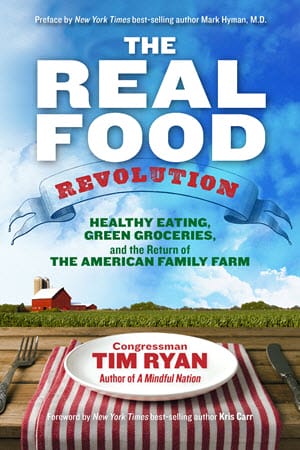Congressman Tim Ryan and The Real Food Revolution
The Real Food Revolution
by Congressman Tim Ryan

Hello. My name is Tim Ryan. I am addicted to chicken wings and ice cream. Ask anyone. My wife, my friends, my acquaintances. Oh yeah. We could finish a huge meal and a half hour later I’ll crave a handful of buffalo chicken wings just to wrap up the night.
One night out on the road with my brother Al and some friends I had an incident. Al was already asleep in the hotel room we were sharing, having gone up to bed not long after dinner. I came in, and, you guessed it, I ordered some chicken wings and a side of ice cream from room service. While I waited for my food I turned on the TV, took off my shirt, and stretched out on the bed. As I flipped through the channels I found the old, original Batman TV show. You know, the one with Adam West where Batman and Robin almost die at the end of every episode. Eventually the chicken wings and ice cream arrived. I immediately started eating the wings, piling the bones on a plate next to me on the bed.
Then as I began to put a scoop of ice cream in my mouth something terrible happened. Al rolled over and looked at me with wing sauce on my face and ice cream heading to my mouth. Busted, I thought. He then looked at the TV and didn’t see an old movie or Sports Center, but a Batman rerun from the 70s. He turned back to me with a look only an older brother could give a little brother and said, “What in the hell are you doing?”
Trying to at least sidestep the food issue, I said, “I think this is the final episode. The Joker really has Batman and Robin in the crosshairs.”
All he said was, “You got issues” and rolled over and went back to sleep.
I share this story because I want you to know that I am not a purist. I am not an absolutist or an extremist. I love food and lots of different kinds of food. I go on different diets and then I cheat. Every week I try to watch what I eat—to be good, so that at some point I can be bad. But I have, slowly and over time, moved myself in the direction of healthier eating. I have started to pay more attention, especially now that I am married with two stepchildren and a new son on the way.
It seems that everything is so complicated these days—particularly in Washington, D.C.—which is why I revel in finding something simple to follow. The kind of advice grandmothers give to small children. Like the first words of Michael Pollan’s In Defense of Food: An Eater’s Manifesto: “Eat food. Not too much. Mostly plants.” By food, he means whole food, real food, not “food-like substances.” I try to do that these days.
While I have had personal setbacks like the one with my brother, as a member of the United States Congress I have also watched many public setbacks as our government continues policies and strategies that make eating bad food or fake food the most convenient option. I’m guessing you know what I mean by fake food. In fact, I saw some just a few minutes ago at the checkout counter when I was buying some sticky-notes and printer paper at Staples. (Yes, we buy food at office supply stores these days. Go figure.) It was a package of super-stuffed cheese cracker sandwiches, but there was nothing in it that resembled what my grandparents would have called “cheese,” and the top ingredients were corn sweetener and oil from soy and some highly processed flour, and then the usual bunch of unpronounceable ingredients to make the snack look more appealing and last until my ten-year-old daughter graduates from college. We love this food (we must, because the Fortune 500 companies behind the tasty snacks and quick, prepared meals for us earned $439 billion in 2012), but I’m not so sure it loves us back.
Why does this matter to a US Congressman? It matters because cheap, convenient food is costing us a lot in health care costs down the road, and because the most important resource we require to be a dynamic, innovate country is broken:
- 35 percent of adults are obese
- Childhood obesity has more than doubled in children and quadrupled in adolescents in the past 30 years
- In 2012, more than one third of children and adolescents were overweight or obese
- In 2012, 15% of American households were food insecure, accounting for 49 million Americans, 33.1 million adults and 15.9 million children.
Simply put, whether it’s obesity, food insecurity, or other negative health outcomes from poor nutrition, the majority of Americans, are ill-served by our food system. That’s a crisis, I’d say.
The kind of food we get and how we get it matters, because, in fact, we have come to the point where the government is effectively “prescribing” a diet for Americans, and prescribing medicine, because the diet is making enough people unwell that they require expensive medication to compensate.
It is your tax dollars that are going to make fake food cheap. Yes, I said it. And it is true. Hardworking families try to make ends meet and also meet their societal obligations by paying taxes. And what does the United States Congress do with that money: they make fake food cheap and easily accessible to everyone. The massive payments we make to “support” our food system, go largely to big producers for corn, soy, and wheat (the feedstock for so much fake food) and little to smaller, regional farmers producing diversified crops, including fruits and vegetables, in more sustainable and humane ways. And then we eat that food, get sick, and need care, which is often funded by the government. So we pay to make cheap food, and then we pay to heal people who eat that cheap food.
About now, you might be thinking uh-oh, this book is just going to bum me out and make me reach for a bag of potato chips, a Coke float, and the TV remote to chill out. Yes, I do feel the need to share some of the bad news that doctors, farmers, cooks, and food and environmental activists have shared with me, but I hope this acts not to bum you out, but instead to fire you up. In fact, I think you’ll find it interesting, if not a little shocking. I hope you see it as a wake-up call to help us focus on what we need to do. That’s what the first part of this book is about.
But have no fear—things are changing. Part II of this book outlines what I call the Real Food Revolution. Yes, change is already underway. There are amazing people out there doing amazing things. And they started just like you and I. They saw a problem and tried to fix it. And we can all join with them—or step out on our own—to help move our national diet and the supply chain that supports it in the direction of greater health, well-being, and sustainability.
I hope that after reading this book you will join this broader movement of Americans who want to create a big shift in what is sold in our grocery stores and restaurants and at what price.
The Real Food Revolution is a political book, a community organizing book, a call to action. At the end of each chapter in Part II, I lay out specific things you can do to join the movement—much of it from the comfort of your own home, using the internet (Thank You, Al Gore), your phone, and even the mail if you like. But if we are going to really make a dent it is going to take each of us dedicating a little bit of our time to not just visualize what we want the future to look like, but also to organize that future. There are opportunities everywhere. You can even get out and join up with like-minded folks and get your hands dirty (sometimes literally).
Let’s do this thing!
Click HERE to Connect with your Daily Horoscope!
About the Author
Tim Ryan was first elected to the U.S. House of Representatives in 2002, at the age of 29, and is currently serving in his fifth term representing Ohio’s 17th Congressional District. He maintains a strong commitment to the economic and social well-being of his constituents in northeast Ohio. He serves as a member of the House Armed Services Committee, as well as its Subcommittees on Readiness and on Emerging Threats and Capabilities.
He also serves as a member of the House Budget Committee and co-chairman of the Congressional Manufacturing Caucus. Congressman Ryan has a daily mindfulness meditation practice. He has been an outspoken advocate for promoting mindfulness practice as an aid to dealing with the variety of complex problems facing the nation. During his tenure in the House, he has helped to get mindfulness and social and emotional learning programs established in several schools in his district. He also spearheaded a conference at a medical school in his district on Mindfulness-Based Stress Reduction.
Congressman Ryan is a 4-time recipient of the Golden Triangle Award, the National Farmers Union’s highest legislative honor. The award is presented to members of Congress who have demonstrated leadership and support policies that benefit America’s family farmers, ranchers, fishermen and rural communities.
Website: http://timryan.house.gov/
OMTimes Magazine is one of the leading on-line content providers of positivity, wellness and personal empowerment. OMTimes Magazine - Co-Creating a More Conscious Reality










